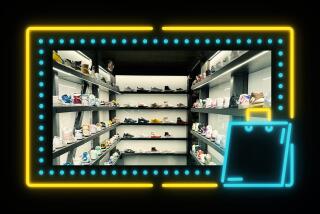Nothing Cheap at John Lobb of London : Boot Maker Serves Royalty, Stars
LONDON — In a dimly lit basement in London’s affluent St. James’s Street, thousands of pairs of famous feet lie in racks, waiting.
The queen of England is close to Guy Burgess, the traitor who betrayed her country. Frank Sinatra is not far away.
The names on the hand-carved wooden lasts, perfect copies of their owners’ feet down to the last bunion, belong to the well-heeled clientele of John Lobb, the royal boot makers.
As a shrine of the legendary, even the pavement outside Mann’s Chinese Theater in Hollywood, studded with cement footprints of generations of film stars, pales in comparison.
Even Ostriches
Since 1849, Lobb has been turning the skins of calves, lizards, pythons, elephants, deer and even ostriches into hand-made footwear for the rich and famous.
The lasts mean that clients like Princess Diana and the Aga Khan can phone in an order for a new pair of pumps without having to be remeasured--at a price.
You could buy a horse for less than Lobb charges for a pair of riding boots. Even a new sole and heel will leave you little change from $110.
But that doesn’t seem to bother the patrons, ranging from royalty to rock stars, who do not wince at paying prices which generally start at $590.
The sandals favored by Saudi Arabia’s oil minister, Sheik Ahmed Zaki Yamani, come a little cheaper, though a pair of lace-ups made of crocodile skin will set you back around $1,560.
“You can cross the Atlantic on a fishing boat or the QE2,” says Eric Lobb, the shop’s current proprietor and grandson of the founder, “but there’s really no comparison.”
Distinguished as Clients
Lobb, a traditionalist now approaching 80 and looking every bit as distinguished as his clients, has steadfastly refused to lead the firm into the ready-made end of the market. It is now the only London boot maker relying exclusively on custom-made items.
Nonetheless, there is a six-month waiting list for a new pair of shoes from customers who order anything from two to two dozen pairs a year. More than 70% of new orders now come from abroad--predictably from the United States, Japan and the Middle East, for the most part.
“There just isn’t as much money in England as there was 50 years ago,” says Lobb, though wealthy British customers up from their country estates for the day still leave their dogs to be looked after at the shop while they stroll around the corner for lunch at their gentlemen’s club.
But Lobb does not cater just for the gentry. When the craftsmen there are not sewing together a new pair of riding boots for Prince Philip, they are happily producing some gold and silver pointed slippers for pop stars. “The motto here,” says Lobb, “is ‘we’ll put the toe on the heel if you’ll pay for it.’ ” And they frequently do.
Lobb has even made a boot for a three-legged boxer dog that lost a leg in an accident. Its wooden stump kept wearing out, so the dog’s loving owner ordered a smart leather boot for it to wear over the stump. The canine boot has even been back to the shop for resoling.
Great Train Robber
Before he fled to Moscow in 1951, Burgess regularly came in to place a new order. One of the gang who carried out the Great Train Robbery in England in 1963--then the largest ever haul in British crime--came in last year to collect a pair of shoes he had ordered before being caught. They had been stored away for collection all the years he was serving his prison sentence.
Lobb’s office is garlanded with framed checks from the queen, Prince Philip and the late Lord Mountbatten as well as others from the late Ethiopian Emperor Haile Selassie and former British Prime Minister Harold Macmillan.
A showcase in the main shop houses the dainty wooden lasts used to make shoes for Queen Victoria and those of King George V together with a miniature of the first Wellington boot. It was sent to the Duke of Wellington out in the field to see if he approved of the design. He did.
Pair for Charles
“Of course, I was really excited the first time I worked on a pair of riding boots for Prince Charles,” said Neil McLaren, one of the craftsmen who carve the wooden lasts in the London workshop.
“But you get used to seeing lords and famous people after a while and we try and treat everyone the same, whoever they are.”
McLaren, sent for a job interview by his local employment office after school, thought it was going to be a shoe repair shop. He grabbed the chance to sign up as an apprentice.
“You see another side of life working here,” he said, leaning against the basement racks stacked with 20,000 to 30,000 sets of lasts, some of them scrawled with names like inventor Guglielmo Marconi, actor Bela Lugosi and Aristotle Onassis.
But immortal feet are few. As for the others: “We destroy them if the owners die or if we haven’t received an order for about 15 years,” said Lobb.
“Usually I take them home and put them on the fire. They’re very good for firewood.”
More to Read
Sign up for Essential California
The most important California stories and recommendations in your inbox every morning.
You may occasionally receive promotional content from the Los Angeles Times.










